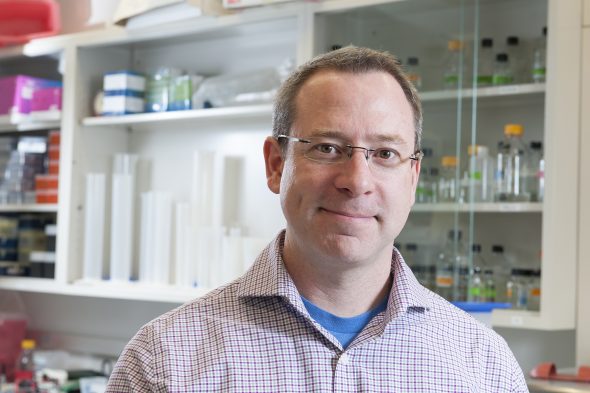To fight disease, disrupt the way bacteria cells communicate
The Researcher of the Year Award recognizes 10 UIC scientists who are advancing knowledge in their fields. The Distinguished Researcher Award honors five researchers with a record of outstanding achievement. The Rising Star Award honors early-career researchers who show promise as future leaders.
BASIC LIFE SCIENCES
Michael Federle
Rising Star
Michael Federle didn’t peer into a crystal ball to see his future. It was a microscope.
Federle has been hooked on science since junior high, when he got his first glimpse of magnified cellular organelles. The direction of his career became clear when he was a graduate student at Emory University.
“I’ve been interested in microbial cell-to-cell communication since the day I held a Petri dish with colonies of glow-in-the-dark bacteria,” Federle says. “It was like gazing at the night sky, full of stars.”
Federle studies quorum sensing — the way bacteria cells communicate with each other. Eventually, resistance develops to every antibiotic developed to fight bacteria that cause illness. He wants to convince these microorganisms to remain in a nonhostile state.
Federle’s primary research centers on the group of bacteria known as streptococci, responsible for strep throat, meningitis, bacterial pneumonia, endocarditis, erysipelas and the “flesh-eating” necrotizing fasciitis. His work explores ways to disrupt biofilms — communities of bacteria that live on a surface that are extremely resistant to antibiotics.
Manipulating bacteria that cause health complications is Federle’s long-term goal. Bacteria enter the body and grow quietly until a switch is flipped, causing docile bacteria to turn rogue and inflict tissue damage.
“If we can manipulate bacteria by understanding the chemical signals they use, then we can interfere with the bacteria’s ability to make people sick,” he says. “We’ll try to fool the bacteria by artificially stimulating them.”
Federle, associate professor of medicinal chemistry and pharmacognosy, joined the College of Pharmacy faculty in 2008. Since then he has amassed nearly $4.5 million in funding for his research and published nearly 20 papers in peer-reviewed journals. In 2013 he was one of 10 scientists in the U.S. to receive a five-year grant from the Burroughs Wellcome Fund to study quorum sensing in bacterial pathogens that cause human infectious diseases.

